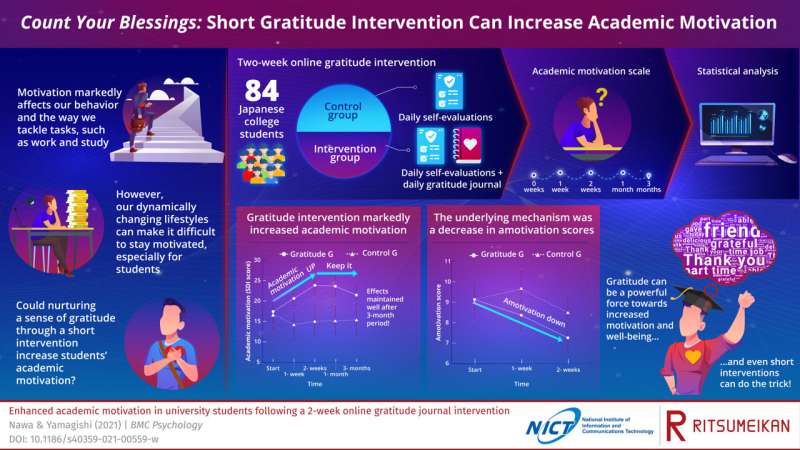Count your blessings: Short gratitude intervention can increase academic motivation

Because of the ongoing pandemic, lifestyles have been subjected to drastic and dynamic changes, and many work- and study-related activities are now carried out online exclusively. This, among other complex factors, has made it difficult for some people to stay focused and motivated, and psychology researchers are trying to find effective and widely applicable solutions to address such problems.
In a recent study published in BMC Psychology, researchers from Ritsumeikan University and the National Institute of Information and Communications Technology (NICT), Japan, have explored a simple strategy to increase motivation in college students by nurturing a positive emotion: gratitude. Many studies have shown that even short “gratitude interventions,” which are activities that increase an individual’s awareness of feelings of gratitude, can have a lasting positive effect on that person’s mood, satisfaction and well-being. However, based on previous studies, the available evidence on the effect of such interventions on academic motivation is inconclusive. This prompted the researchers to test the effects of a different type of gratitude intervention: daily gratitude journaling.
“Our main hypothesis was that engaging in an online gratitude journal by writing down up to five things one felt grateful for each day could make students be more aware of their academic opportunities—their ‘blessings’—and help them re-evaluate their motives and goals, ultimately improving their motivation,” explains Dr. Norberto Eiji Nawa from NICT, first author of the study. They recruited 84 participants, all Japanese college students, and divided them into a control group and an intervention group. Over the course of two weeks, students in both groups had to evaluate aspects of their daily life through online questionnaires each day, but only the intervention group had to keep the online daily gratitude journal. At the start of the intervention and after one and two weeks, and one and three months, the participants had to complete the Academic Motivation Scale (AMS), a tried-and-tested tool for measuring different aspects of academic motivation.
The results were promising; through statistical analyses, the researchers found that the gratitude intervention through daily journaling significantly increased the students’ academic motivation. Most notably, this robust positive effect was not restricted only to the two-week period of the intervention, as the increased level of academic motivation was maintained even after three months. In addition, through an exploratory analysis, the researchers established that the enhancement in academic motivation was mostly driven by a decrease in “amotivation scores.” Amotivation, in this context, refers to the state in which a person perceives that their own actions are irrelevant to the resulting outcomes, leading to feelings of helplessness and incompetence.
Academic motivation can be one of the primary determinants of both academic achievements and satisfaction with school life, and developing widely applicable intervention strategies is critical to foster student growth. “Online interventions have the advantage of being more accessible, scalable and affordable to large portions of the population. Gathering solid evidence to support their deployment will be essential to unleash their true potential in the future,” concludes Professor Noriko Yamagishi from Ritsumeikan University. It appears that the positive impact of gratitude interventions extends well beyond the already documented effects on individual well-being.
Source: Read Full Article
